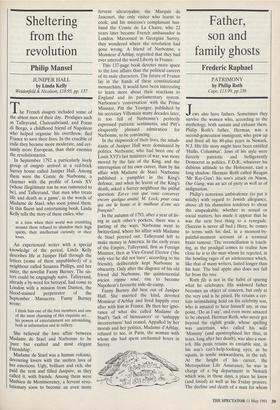Sheltering from the revolution
Philip Mansel
JUNIPER HALL by Linda Kelly Weidenfeld & Nicolson, £18.95, pp. 137 The French émigrés included some of the ablest men of their day. Prodigies such as Talleyrand, Chateaubriand, and Pozzo di Borgo, a childhood friend of Napoleon who helped organise his overthrow, fled France to save their lives. In the crucible of exile they became more moderate, and cer- tainly more European, than their enemies the revolutionaries.
In September 1792 a particularly lively group of émigrés arrived at a red-brick Surrey house called Juniper Hall. Among them were the Comte de Narbonne, a charmer with the profile of Louis XV (whose illegitimate son he was rumoured to be), and Talleyrand, 'that man who treats life and death as a game', in the words of Madame de Stael, who soon joined them. In this fluent and entertaining book, Linda Kelly tells the story of these exiles, who
at a time when their world was crumbling around them refused to abandon their high spirits, their intellectual curiosity or their loves.
An experienced writer with a special knowledge of the period, Linda Kelly describes life at Juniper Hall through the letters (some of them unpublished) of a neighbour called Susanna Phillips, and her sister, the novelist Fanny Burney. The sis- ters could be engagingly naive. Talleyrand, already a by-word for betrayal, had come to London with a mission from Danton, the blood-stained perpetrator of the September Massacres. Fanny Burney wrote: I think him one of the first members and one of the most charming of this exquisite set.. . his powers of entertainment are astonishing, both in information and in raillery.
She believed the love affair between Madame de Stael and Narbonne to be `pure but exalted and most elegant Friendship'.
Madame de Stael was a human volcano, devouring lovers with the molten lava of her emotions. Ugly, brilliant and rich, she paid the rent and filled Junipere, as they called it, with friends. Among them were Mathieu de Montmorency, a fervent revo- lutionary soon to become an even more fervent ultraroyalist; the Marquis de Jaucourt, the only visitor who learnt to cook; and his mistress's complaisant hus- band the Comte de La Chatre, who 22 years later became French ambassador in London. Marooned in Georgian Surrey, they wondered where the revolution had gone wrong. A friend of Narbonne, a Monsieur d'Arblay, regretted that they had ever uttered the word Liberty in France.
This 137-page book devotes more space to the love affairs than the political careers of its male characters. The future of France lay in the hands of these constitutional monarchists. It would have been interesting to learn more about their reactions to England and its parliamentary system. Narbonne's 'conversation' with the Prime Minister, Pitt the Younger, published by his secretary Villemain many decades later, is too full of Narbonne's perfectly expressed patriotic sentiments, and Pitt's eloquently phrased admiration for Narbonne, to be convincing.
In the shipwreck of their lives, the inhab- itants of Juniper Hall were dominated by politics. Narbonne, who had been one of Louis XVI's last ministers of war, was more moved by the fate of the King, and the interruption of his own career, than by his affair with Madame de Stael. Narbonne published a pamphlet in the King's defence, and when he learnt of the King's death, asked a Surrey neighbour the pitiful question: Est-ce vrai que vous conservez encore quelque amide, M. Lock, pour cewc qui ont la honte et le malheur d'etre nes francais? In the autumn of 1793, after a year of liv- ing in each other's pockets, there was a parting of the ways. Narbonne went to Switzerland, where his affair with Madame de Stael petered out. Talleyrand left to make money in America. In the early years of the Empire, Talleyrand, first as Foreign Minister, then as Vice-Grand Elector (`the only vice he did not have', according to his friends), deliberately kept Narbonne in obscurity. Only after the disgrace of his old friend did Narbonne, the quintessential ancien regime roué, rise to become Napoleon's favourite aide-de-camp. Fanny Burney did best out of Juniper Hall. She married the kind, devoted Monsieur d'Arblay and lived happily ever after with him in France. By then her igno- rance of what she called Madame de Stael's 'lack of bienseances' or 'unhappy incorrectness' had ceased. Appalled by her morals and her politics, Madame d'Arblay, refused to see, in Paris, the woman with whom she had spent enchanted hours in Surrey.


























































 Previous page
Previous page